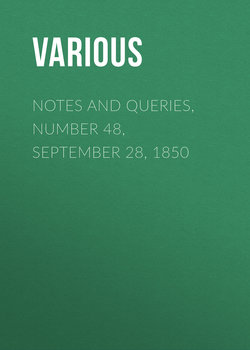Читать книгу Notes and Queries, Number 48, September 28, 1850 - Various - Страница 4
NOTES
ETYMOLOGICAL NOTES
Оглавление1. Gnatch.—"The covetous man dares not gnatch" (Hammond's Catechism). From this, and the examples in Halliwell's Dictionary, the sense seems to be "to move." Is it related to "gnake?"
2. Pert.—I lately met with an instance of the use of this word in the etymological sense peritus: "I beant peart at making button-holes," said a needlewoman.
3. Rococo.—A far-fetched etymology suggests itself. A wealthy noble from the north might express his admiration for the luxuries of Paris by the Russian word [Cyrillic: roskosha], or Polish roskosz. A Frenchman, catching the sound, might apply it to anything extravagant enough to astonish a barbarian.
4. Cad.—The letters from Scotland ascribed to a Captain Burtt, employed in surveying the forfeited estates, give an account of the "cawdies," or errand boys, of Edinburgh.
5. Fun, perhaps Irish, fonamhad, jeering, mockery (Lhuyd, Archæologia Britannica).
6. Bumbailiff.—The French have pousse-cul, for the follower or assistant to the sergeant.
7. Epergne, perhaps épargne, a save-all or hold-all. Here seems no more difficulty in the transfer of the name than in that of chiffonier, from a rag-basket to a piece of ornamental furniture.
8. Doggrel.—Has the word any connexion with sdrucciolo?
9. Derrick.—A spar arranged to form an extempore crane. I think Derrick was the name of an executioner.
10. Mece, A.-S., a knife. The word is found in the Sclavonic and Tartar dialects. I thinly I remember some years ago reading in a newspaper of rioters armed with "pea makes." I do not remember any other instance of its use in English.
F.Q.
